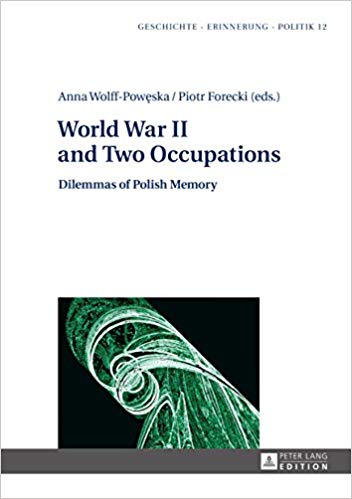Polonophobic Memes Jews Never Wrong Forecki

World War II and Two Occupations: Dilemmas of Polish Memory, by Anna Wolff-Poweska and Piotr Forecki (eds.) 2016
The Zydokomuna (Judeo-Bolshevism) Whitewashed and Exculpated. OUN-UPA Genocide Relativized
Let me begin saving the reader some time. A much better book, on this overall subject, is FORGOTTEN HOLOCAUST, by Lukas.
The very title of this book (“dilemmas”) is biased. It implies that Poles have some kind of problem. The Polonophobes have a problem, not the Poles.
Most of this book is so-so. It contains some whoppers. I focus on two of them.
EXCUSES AND EXCUSES FOR THE FACT OF THE ZYDOKOMUNA
This German-published book contains a very puerile exculpatory article, on Jews in Communism, by Anna Zawadzka. Then again, it figures. She is identified as having an interest in so-called Gender Studies (p. 282). She is a LEWAK. In fact, she calls the Zydokomuna a form of hate speech. (p. 256). This is classic LEWACTWO, in which rational thinking is replaced with the standard, canned accusation of (what else?) hate (hejt) speech. Moreover, she treats Communism as if it was some kind of innocent little fad that post-WWII Poles could take or leave.
The author gets bogged down in vague, convoluted reasoning about the statements of historians Marek Jan Chodakiewicz and Piotr Gontarczyk. However, she provides no evidence that they are wrong.
Anna Zawadzka complains that the Jews of Poland were generally seen as alien. (p. 251), and that this was–surprise, surprise–all the Poles’ fault. What she does not tell the reader is that, since the dawn of history, and until fairly recent times, Jews themselves had considered themselves very much alien to the despised GOYIM, and had chosen to live in self-imposed apartheid. Furthermore, they always had considered themselves a separate nation (e. g, “Next year in Jerusalem” ).
Taking her illogic further, author Zawadzka would have us believe that Jews owed Poland no loyalty owing to the fact that they had not been accepted into Polish society. I beg pardon. Who sets preconditions upon whom? Is this Poland, or is this Israel? Note also that Jews had been welcomed into Poland centuries earlier when they had to flee other nations. Finally, Jews were eating Polish bread and butter, and were making money (some in considerable amounts) off both Polish nobility and Polish peasants. So the “Jews owed Poles nothing” notion does not wash. In fact, it sounds very Judeocentric if not positively selfish.
Anna Zawadzka dusts off the “Jews had it bad” spin, which sounds like an attorney trying to excuse the criminality of his client saying that “He had an unpleasant life”. Anybody can make up such a sob-story argument. Recall how Germans excused their support for Nazism by saying that they “had it bad” under the Versailles accords.
And “bad” in comparison with what? The average Jew in Poland was better off than the average Pole, and Jews as a whole enjoyed complete religious and cultural autonomy. 1918-era Hungary is especially instructive. Jews there had enjoyed a relatively high standard of living, and there had been no pogroms. Yet this did not prevent Hungarian Jews from massively supporting Communism in 1918-1919. So the “Jews had it bad” notion collapses.
The author continues to clutch at straws as she repeats the old saw that Jewish Communists were not really Jews. Oh, please! That’s like saying that Lenin was “not a real Russian” or that the Nazis “were not real Germans”.
Anna Zawadzka abandons any semblance of historical perspective as she brings up an assortment of excuses (e. g., the ghetto benches: p. 258), all of which came long AFTER Jews had been massively over-represented in Communism. Even then, her reasoning is totally flippant. For instance, what is supposed to be so inherently terrible about the ghetto benches when Jews themselves regularly engaged in segregated seating at the time (high-status Jews sitting apart from “ordinary” Jews, and women sitting apart from men, in synagogues)?
Enough said. What’ s your excuse?
MUDDYING THE WATERS ON THE OUN-UPA GENOCIDE OF POLES
Author Lech M. Nijakowski (pp. 53-on) creates a contrived ambiguity about the genocide. He would have us believe that the genocidal slaughter of Ukrainians and Poles had been mutual (much as some Turks would have us believe that the 1915 slaughter of Armenians and Turks had been mutual and non-genocidal). Such an apparent symmetry is utter nonsense. There was no “Polish-Ukrainian war” at all until Poles began fighting back, and that was several months AFTER tens of thousands of mostly-defenseless Polish men, women, and children had already been murdered the OUN-UPA. Finally, and belatedly, Ukrainian civilians killed in Polish reprisals do not exceed 5% of Polish civilians slain by Ukrainian nationalists.
To see a series of truncated reviews in a Category click on that Category:
- All reviews
- Anti-Christian Tendencies
- Anti-Polish Trends
- Censorship on Poles and Jews
- Communization of Poland
- Cultural Marxism
- German Guilt Dilution
- Holocaust Industry
- Interwar Polish-Jewish Relations
- Jewish Collaboration
- Jewish Economic Dominance
- Jews Antagonize Poland
- Jews Not Faultless
- Jews' Holocaust Dominates
- Jews' Holocaust Non-Special
- Nazi Crimes and Communist Crimes Were Equal
- Opinion-Forming Anti-Polonism
- Pogrom Mongering
- Poland in World War II
- Polish Jew-Rescue Ingratitude
- Polish Nationalism
- Polish Non-Complicity
- Polish-Ukrainian Relations
- Polokaust
- Premodern Poland
- Recent Polish-Jewish Relations
- The Decadent West
- The Jew as Other
- Understanding Nazi Germany
- Why Jews a "Problem"
- Zydokomuna